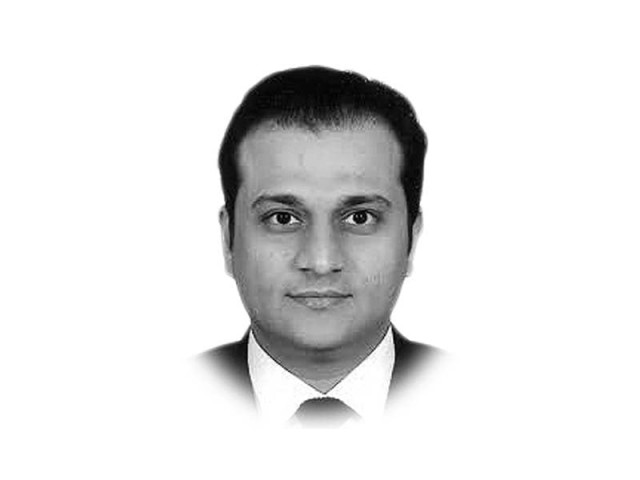Pakistan’s financial mismanagement
PML-N government has been supposedly “blessed” with stable management in the Cabinet

The writer is a barrister and former adviser to the Sindh chief minister
Whilst the PPP government suffered at the hands of a challenging local and global financial market as well as the unsettled finance ministry, the PML-N government has been supposedly “blessed” with stable management in the Cabinet. Those appointed in the beginning of the term, especially in critical positions, continue to hold forte. The question is: is the economy better off or not? And more importantly, is the common Pakistani man deriving any benefit from the economy?
Pakistan is an economy which is dependent on internal consumption. A population of 200 million plus, with demographics tilted towards the younger demographic, economic growth on the back of consumption is an absolute certainty. Despite an unfavourable market situation and global financial crisis, Pakistan’s GDP grew year after year between 2008 and 2013 and so did the exports. Following the succession of events from the formation of the PML-N government, signing up to the IMF programme, relative stability in the government and the blessing of lowest oil prices, Pakistan’s economy should be doing better. But is it? Key indicators like the trade deficit has widened and remittances have slowed down. Stock of debt and its servicing is ballooning. The Pakistani rupee had remained under control, but the recent slide in rupee value once again shows that the alleged stability was only artificial as opposed to being backed by a stable economy. This may have disastrous effects as people may remember for years. Under the Musharraf regime, the US dollar remained stable between 60 and 63; come 2008, financial crisis caused the slide to be 36% within a year and so on. Inflation increased and overall prospects looked dim. Even right now, financial analysts and economists are anticipating a 10-12% devaluation of our currency against the greenback. This means that there isn’t sufficient supply of US dollars as compared to its demand which can be mainly attributed to a drop in our exports and remittances. Our foreign exchange reserves stand at a paltry $16 billion despite the fact that oil prices have been consistently at an all-time low and the much-talked about foreign investment that this government claims to have secured. Needless to say, the oil bill constitutes the most significant chunk of our import bill. Historically, we have seen slumps after change of government. Is Mr Dar holding the rupee rates in order to protect his government and leave excuses to the next in line? A 10-12% decline is going to cause a direct shock to the liabilities that the government has added in the last four years, especially with regard to the foreign debt. It will cause inflation to rise and then interest rates will surely increase.
A 10% devaluation of the rupee will increase the external debt liability of the country by almost Rs800 billion. The shock will be very high. Additionally, with a widened trade deficit, the situation will snowball. On 5th July, the PKR had begun depreciating mainly because of change in reporting of Current Account Balance. While change in the method of calculating national accounts in line with International Standards is a good move, what has alarmed people is that the impact of change has been for the worse: due to the compilation of new information on foreign currency accounts transactions, imports have been revised upwards, leading to current account balance of July-May 2017 increasing from $8.9b to $10.6b. This sharp revision upwards was not expected and makes one worry about the state of the economy by way of data reporting.
While the ruling party talks about the growth under their watch, the inequitable distribution of wealth and resources across the federation is becoming stark. Provinces are suffering because arbitrary taxation measures being employed by the federal government are against the taxes which provinces have been trying to raise. The National Finance Commission Award, which provides 57.5% of Pakistan’s revenue to the provinces, expired on 30th June, 2015 and since then the provinces have been seeking an upward revision of their respective shares. However, Mr Dar, instead of paying heed to such genuine demands, is actively seeking to reduce the share of provinces to only 50% under the garb of various causes.
While Lahore and Islamabad are being cited as successes of the PML-N government, just off GT Road and M2, the effects of Pakistan’s growth story are less visible. The smaller provinces have time and again urged the federal government for its assistance in the development of infrastructure projects. However, we have failed to see a genuine, tangible response. The much talked about Karachi-Hyderabad Motorway portion inaugurated by the Prime Minister earlier this year presented a very sorry picture within a couple of weeks of its inauguration. The province of Sindh has actively sought the help of the federal government for an increased contribution in revised costs of national interest projects like construction of LBOD, K-4 & S-3. However, the response of the federal government has not been very comforting for the government of Sindh.
The whole country has been on tenterhooks for the past several months on account of the Panama Papers and JIT investigations, but what is being ignored is the economy and the effects of that is becoming visible on a daily basis. Maybe the PML-N is seeing the writing on the wall in the next general elections and wants to leave a weak economy, however, the efforts will be considered as nothing but deliberate and with criminal intent.
Published in The Express Tribune, July 12th, 2017.
Like Opinion & Editorial on Facebook, follow @ETOpEd on Twitter to receive all updates on all our daily pieces.














COMMENTS
Comments are moderated and generally will be posted if they are on-topic and not abusive.
For more information, please see our Comments FAQ